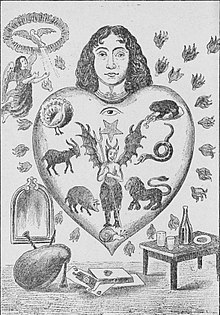Seven deadly sins
The seven deadly sins, also known as cardinal sins, are types of sins within some Christian teachings, although they are not mentioned in the Bible. Behaviors or habits are grouped into this category if they directly form other wickedness. According to the regular list, they are pride, greed, wrath, envy, lust, gluttony and sloth, which are the opposite of the seven heavenly virtues. These types had their origins with the Desert Fathers, who recognized seven or eight evil thoughts. The seven deadly sins were portrayed in paintings and decorations on churches, as well as in older textbooks.


Modern definitions and views
changeMost of the seven deadly sins are defined by Dante Alighieri as wicked versions of love. The seven deadly sins from lust to envy are generally associated with pride.
Ranked in order of least evil to most evil like in Dante's Divine Comedy, the seven deadly sins are:
- Lust — Lust is one of the seven deadly sins. Lust is a term for a strong wanting for something while already having a significant amount of the desired object. Lust can take any form such as the lust for sexual acts, money, or power.
- Gluttony — Gluttony is one of the seven deadly sins. Gluttony is a term for excessive desire for food, drinks, or items.
- Greed — Greed is one of the seven deadly sins. Greed is a term for a strong and uncontrollable desire to have more wealth than is needed.
- Sloth — Sloth is one of the seven deadly sins. It is the most difficult sin to explain, since it refers to an assortment of ideas. Sloth is a constant unwillingness to exertion, or laziness. Sloth refers to a person not wanting to work, because of a lack of motivation.
- Wrath — Wrath is one of the seven deadly sins. It refers to an intense emotional state involving a strong response to a threat or warning. Wrath occurs when we are threatened, offended, wronged, or denied something we really want or need.
- Envy — Envy is one of the seven deadly sins. It refers to a feeling people get when they want what others have. This is a negative feeling. When someone is envious of someone else, they usually dislike the other person. These emotions are usually caused by a person having a certain object which you want but can not get.
- Pride — Pride is one of the seven deadly sins. Pride refers to someone who has an exaggerated sense of feeling good. This might mean that someone has no respect for what other people do, only respect for what he or she does. Someone who is described as proud may be arrogant or boastful.
People notice that some of these sins are connected. They have attempted to set down an order to them. Each of these cardinal sins are ways of not loving God and not loving others as much as oneself.
The opposite of these sins are the seven heavenly virtues: chastity, moderation, charity, zeal, meekness, generosity, and humility.
Punishments
changeAccording to the Divine Comedy, there are punishments for those who die with unconfessed deadly sins.
The Lustful are swept around by a strong wind, without ever resting. This is because lust is so powerful, that it can blow one around without need.[1]
The Gluttons are forced to lie down in a kind of snow, made by freezing rain, black snow, and hail. This symbolizes what they made with their life.[2]
The Greedy are boiled in hot oil, it's the best oil that money can buy, but it's still pretty hot and you will be turned into gold.
The Slothful are thrown into a snake pit where the indolent will have to move around to get the snakes off them eternally.
The Wrathful’s limbs are ripped apart, because the furious use their arms and/or legs in their act of violence.